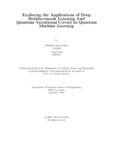| dc.contributor.advisor | Upoma, Ipshita Bonhi | |
| dc.contributor.advisor | Rahman, Md Reshad Ur | |
| dc.contributor.author | Saha, Prashanta Kumar | |
| dc.contributor.author | Saha, Vishal | |
| dc.date.accessioned | 2021-12-01T05:40:08Z | |
| dc.date.available | 2021-12-01T05:40:08Z | |
| dc.date.copyright | 2021 | |
| dc.date.issued | 2021-09 | |
| dc.identifier.other | ID 17301103 | |
| dc.identifier.other | ID 19101671 | |
| dc.identifier.uri | http://hdl.handle.net/10361/15680 | |
| dc.description | This thesis is submitted in partial fulfillment of the requirements for the degree of Bachelor of Science in Computer Science and Engineering, 2021. | en_US |
| dc.description | Cataloged from PDF version of thesis. | |
| dc.description | Includes bibliographical references (pages 30-31). | |
| dc.description.abstract | In recent years, quantum computing has outperformed classical computing in many
aspects, including the advancement of approaches in Reinforcement Learning prob-
lems. Particularly, it has the power to utilize the quantum phenomena of super-
position and entanglement, that can fastened the calculation of a vast amount of
data which is very challenging for classical computers. Unfortunately, the current
Quantum Computing platforms are very complex to initiate classical reinforcement
learning problems for uncontrollability and intricacy of quantum circuits. In our
work, we explore the application of Quantum Variational Circuit (QVC) in Deep Q-
Network (DQN) instead of classical Reinforcement Learning approaches to enhance
the performance of Reinforcement Learning. To achieve that, we use Quantum Vari-
ational Circuit (QVC) based reinforcement learning approaches to solve the classical
problems and we also solve the classical problems using classical DQN and Double
Deep Q-Network (DDQN) Reinforcement Learning to compare between classical
and quantum approaches. We solve Atari and Lunar Lander in OpenAI Gym envi-
ronments using QVC based DQN Reinforcement learning. We study encoding tech-
niques such as amplitude encoding, scaled encoding and directional encoding which
were previously used in this paper[1]. We exercise IBM's open-source SDK (QISKit)
and IBM-Q for quantum circuit implementation which can produce improved appli-
cations like Quantum error Correction codes etc. We also use TensorFlow Quantum
to implement the hybrid classical-quantum computation and experimentally analyze
our work. | en_US |
| dc.description.statementofresponsibility | Prashanta Kumar Saha | |
| dc.description.statementofresponsibility | Vishal Saha | |
| dc.format.extent | 31 pages | |
| dc.language.iso | en | en_US |
| dc.publisher | Brac University | en_US |
| dc.rights | Brac University theses are protected by copyright. They may be viewed from this source for any purpose, but reproduction or distribution in any format is prohibited without written permission. | |
| dc.subject | Quantum computing | en_US |
| dc.subject | Reinforcement learning | en_US |
| dc.subject | Quantum Machine Learning (QML) | en_US |
| dc.subject | Quantum Variational Circuit (QVC) | en_US |
| dc.subject | Deep Q-Network (DQN) | en_US |
| dc.subject | Double Deep Q-Network (DDQN) | en_US |
| dc.subject | OpenAI Gym | en_US |
| dc.subject | IBM-Q | en_US |
| dc.subject | TensorFlow Quantum | en_US |
| dc.subject.lcsh | Data mining | |
| dc.subject.lcsh | Quantum theory | |
| dc.subject.lcsh | Machine learning | |
| dc.title | Exploring the applications of deep reinforcement learning and quantum variational circuit In quantum machine learning | en_US |
| dc.type | Thesis | en_US |
| dc.contributor.department | Department of Computer Science and Engineering, Brac University | |
| dc.description.degree | B. Computer Science | |


